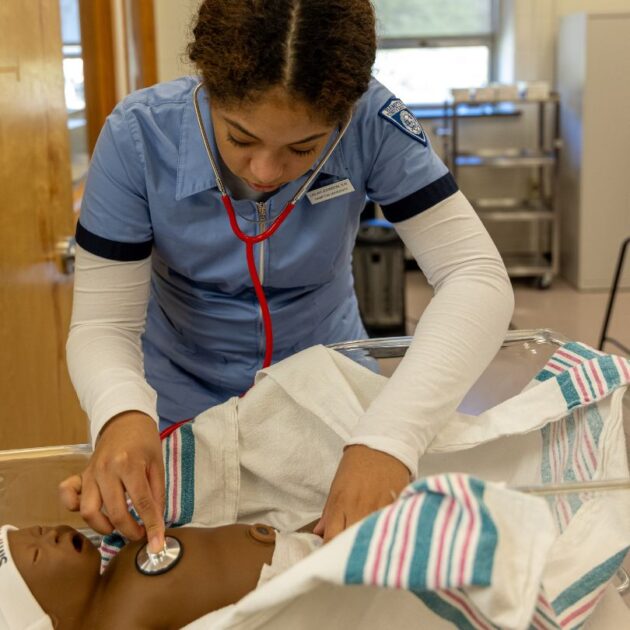School of Nursing and Student Counseling Center Champion Education, Advocacy, and Community-Based Care

Black Maternal Health Week, observed annually from April 11–18, may have concluded—but its urgency endures. This year’s theme, “Healing Legacies: Strengthening Black Maternal Health Through Collective Action and Advocacy,” spearheaded by Black Mamas Matter Alliance, challenges the nation to confront the systemic inequities Black mothers face and to respond with lasting, transformative change.
At Hampton University, that work doesn’t pause when the week ends. Through the pioneering efforts of its School of Nursing, Student Counseling Center, and learnings from the Hampton University Skin of Color Research Institute, Hampton addresses and amplifies not only the systemic injustices Black mothers face but also the power of community-driven solutions and educational institutions in changing the trajectory.
A Legacy Rooted in Healing
For over a century, Hampton University has served as a cornerstone of healthcare innovation in Coastal Virginia. In the late 1800s, it was home to Dixie Hospital, Virginia’s first training hospital for Black nurses. That history of healing and education lives on today in Hampton’s forward-looking healthcare programs, where students are trained not just to treat patients, but to challenge the systems that harm them.
“Our students leave here with more than clinical skills,” said Clinical Nursing Professor Thomasena Wicker. “They graduate as advocates, educators, and healers for communities too often overlooked.”
The Stark Reality
The statistics are staggering. According to the Center for Disease Control and Prevention, Black women in the U.S. are 3.5 times more likely to die from pregnancy-related causes than white women. These disparities persist across income and education levels, making it clear: the issue isn’t about individual behavior – it’s about systems.
Systemic racism, implicit bias, and limited access to culturally competent care continue to fuel this maternal health crisis. According to the 2018 “Listening to Mothers in California” survey, 43% of Black mothers report discrimination during childbirth, and many experience medical gaslighting – where their pain or concerns are minimized or ignored.
Training Future Providers Who See – and Serve – the Whole Person
The path to reversing this trend will involve several actions including access to quality care, and healthcare professionals who are trained to see, hear, and advocate for Black mothers.
School of Nursing students aren’t just learning to treat ailments, they’re learning to lead with compassion and cultural competence. At Hampton, the maternal-newborn nursing curriculum is rooted in both science and empathy. Students train in high-tech simulation labs using lifelike mother-infant mannequins to manage real-world complications that disproportionately affect Black mothers, conditions like pre-eclampsia, gestational diabetes, and preterm birth.
“We emphasize social determinants of health and how they directly influence birth outcomes,” said Wicker. “Our students engage with local clinical agencies to see these issues firsthand and build real solutions.”
That mindset of action is already taking hold. In a recent research methods course, every junior nursing student chose a topic related to Black maternal or child health. This semester, students partnered with the March of Dimes and two other universities to share research, present ideas, and propose community-based interventions.
Mental Health is Maternal Health

The disparities Black mothers face extend beyond biology. Fear, trauma, and emotional stress are frequent companions in the birthing experience – especially when care is dismissive or hostile.
“Black mothers often battle anxiety and trauma linked to medical gaslighting,” said Dr. Kristie Norwood, licensed clinical psychologist and director of Hampton’s student counseling center. “Some wellness practices that may aid Black women include identifying a birthing advocate like a doula or midwife, meditation and deep, somatic breathing, and mental health therapy.”
Therapeutic support can restore autonomy and promote psychological safety, Dr. Norwood added. These practices help Black mothers reclaim their voice and navigate the journey with empowerment and peace.
A National Need for Providers Who Reflect the Communities They Serve
One of the most effective ways to improve outcomes? Representation. Studies show that Black patients experience better health outcomes when treated by Black healthcare professionals. Yet, only 5% of U.S. physicians identify and Black or African American, according to the AAMC’s 2023 Diversity in Medicine report.
That’s where Hampton – and historically Black colleges and universities (HBCUs) across the nation – come in. According to the UNCF, HBCUs train nearly 80% of Black doctors, 70% of Black dentists, and a significant portion of the country’s Black nurses and pharmacists. Hampton students go on to become OBGYNs, labor and delivery nurses, anesthesiologists, and public health advocates – bringing culturally aware care to the bedsides and birth rooms that need them most.
The Work Doesn’t End in April
While Black Maternal Health Week shines a vital spotlight on these issues, Hampton’s commitment to health equity continues year-round. The university’s healthcare leaders, counselors, and students are not just participating in a movement – they are shaping it.
“Addressing maternal mortality isn’t about awareness alone – it’s about changing who’s in the room, how we listen, and how we care,” said Assistant Professor Dr. Angela Sledge. “Our students are equipped to do just that.”
![]()
